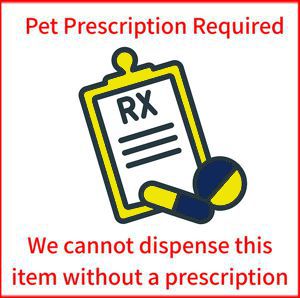Vivitonin for Dogs
What is Vivitonin?
Vivitonin tablets for dogs contain the xanthine derivative propentofylline as an active ingredient. Vivitonin is classified as a prescription only medicine or POM-V and as such, is only available from us with a prescription from your Vet. Online pet pharmacies like ourselves are only allowed to dispense prescription only medicines upon receipt of a valid prescription, written by your vet. This is to ensure that the medicine is used correctly and to safeguard the health and welfare of your pet.
How does Vivitonin work?
Vivitonin increases blood flow within the heart and skeletal muscle. Vivitonin tablets for dogs also increase blood flow to the brain and in doing so, increase the amount of oxygen being supplied. Vivitonin tablets are able to increase the heart rate and also the force of contraction of the heart muscle.
There is also evidence that Vivitonin may reduce the occurrence of abnormal heart rhythms (also know as arrhythmias) in dogs that have sustained damage to the heart muscle.
Vivitonin can also cause dilation of the airways that supply oxygen to the lungs (acting as a bronchodilator). In doing so, the level of oxygen within the blood stream increases and animals often are more interested in exercise and are able to exercise for longer. Vivitonin is able to inhibit platelet aggregation and reduce the formation of blood clots or thrombi that in some situations can be extremely harmful.
What is Vivitonin used for?
Vivitonin is most frequently used in older dogs that have shown a reduction in their willingness to exercise. Often dogs that have become dull and listless with a poor demeanor will show a marked improvement following dosing with Vivitonin. Often, exercise levels will increase markedly, both in terms of a general willingness to exercise and an overall improvement in exercise tolerance.
Vivitonin Tablets are also occasionally used by vets and veterinary cardiologists for the treatment of heart disease, in particular, for the treatment of an abnormal heart rhythm and in situations where improved blood circulation is desirable. In these circumstances, vivitonin may well be given alongside other medications used to control the symptoms of heart failure. It is important that you seek veterinary advice should your pet show signs of reduced exercise tolerance and lethargy. There are a number of possible causes of these symptoms and your vet will be able to guide you toward the most effective treatment.
How is Vivitonin administered?
Vivitonin is available in tablet form and is administered orally.
Vivitonin is available as: Vivitonin 50mg tablets and Vivitonin 100mg tablets
A Veterinary Pet Prescription is Required for Vivitonin
How does Vivitonin help my dog?
Vivitonin is a medication designed to help to support a healthy old age in dogs, and improve some of the negative effects of age-related changes, such as lethargy, reluctance to exercise, and a general lack of interest in their day to day surroundings.
Vivitonin is distributed in the UK by MSD Animal Health, and contains a xanthine derivative of the active ingredient Propentofylline.
Vivitonin can be prescribed to dogs to improve some of the undesirable symptoms of aging, as the body and mind begin their gradual shut down towards the end of their lives. Vivitonin can help to improve your elderly dog’s quality of life, restore their previous enthusiasm for the things that they love, and help them to age comfortably and happily without distress.
Vivitonin has been proven to show a distinct improvement in the activity levels and general demeanour of elderly dogs, and can often extend the viable lifespan of aging dogs by restoring their quality of life and supporting their cognitive functions as they age.
Why might my dog be prescribed Vivitonin?
As your dog ages, they may begin to undergo a range of personality changes as well as physical ones, as the body begins a gradual shut down and the body’s cells renew and reproduce more slowly than they do in younger dogs.
This can lead to a whole range of changes in your dog’s personality, ranging from things such as a reluctance to exercise, a loss of interest in the things that they used to enjoy, barking for no reason, inappropriate toileting, failure to recognise familiar people and surroundings, and a general lethargy and loss of the vital spark that makes your dog who they are.
A lot of the above age-related changes in the dog, and many others, can be attributed in whole or in part to subtle changes in the brain chemistry that accompany senility, and poor systemic oxygenation of the body. Vivitonin can help with these things by boosting your dog’s blood flow and oxygen uptake, increasing circulation and providing additional oxygen to the brain to help to support healthy function.
How does Vivitonin work?
Vivitonin contains the active ingredient Propentofyllin, which produces a systemic effect on the body, causing vasodilation (the widening of the blood vessels) and reducing the viscosity of the blood, all of which increases the flow of blood around the body and to the vital organs.
Vivitonin also has a bronchodilatory effect on the lungs, widening the airways and relaxing the muscles to make breathing easier, which helps to improve your dog’s oxygen uptake rate, and the oxygenation levels of the blood.
In combination, Vivitonin’s systemic effect on the body boosts the circulation and oxygenation of the major organs, providing more energy and enhancing mental acuity, all of which can improve both the general demeanour and activity levels of elderly dogs.
How is Vivitonin administered?
Vivitonin comes in tablet form, in 50mg or 100mg sizes to suit the sizes of different dogs. The usual dosage rate is 6-10mg/kg of bodyweight administered orally twice per day. Vivitonin can be delivered directly into the mouth of your dog, or hidden in a treat or a small amount of food. Vivitonin should not be mixed with your dog’s main meal, and should be given at least 30 minutes before feeding.
Are there any side effects or contraindications?
Vivitonin is generally well tolerated by dogs, and is highly unlikely to produce any undesirable side effects when given in accordance with the guidelines.
The use of Vivitonin has not been evaluated in pregnant or lactating bitches or those intended to be used for breeding, and as such, Vivitonin should not be prescribed to such dogs. As Vivitonin is intended to treat the symptoms and effects of age-related degeneration in dogs, however, it is highly unlikely that Vivitonin will be indicated in the treatment of dogs of breeding age.
In very rare cases, some dogs may prove to be allergic to Vivitonin or one of the inactive ingredients of the medication, so should an allergic skin reaction occur after dosage, treatment should be discontinued.
Careful consideration should be given to using Vivitonin concomitantly with medications prescribed for bronchial conditions or congestive heart failure, as the actions of such medications may be contraindicated for use with Vivitonin.
How can I get Vivitonin for my dog?
Vivitonin is a POM-V medication, which means that it only available with a veterinary prescription after your vet has examined your dog and discussed their symptoms and condition with you.
If your vet decides that Vivitonin may be beneficial for your dog, you can ask them for a prescription to allow you to purchase the product from us.










